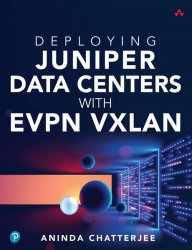Deploying Juniper Data Centers with EVPN VXLAN (Final)
- Добавил: literator
- Дата: 2-05-2024, 06:32
- Комментариев: 0
 Название: Deploying Juniper Data Centers with EVPN VXLAN (Final)
Название: Deploying Juniper Data Centers with EVPN VXLAN (Final)Автор: Aninda Chatterjee
Издательство: Addison-Wesley Professional/Pearson Education
Год: 2024
Страниц: 689
Язык: английский
Формат: pdf (true)
Размер: 19.6 MB
Learn to deploy Juniper Data Centers with EVPN VXLAN and master the only intent-based multivendor solution for deploying and monitoring EVPN-based VXLAN fabrics!
Deploying Juniper Data Centers with EVPN VXLAN is designed for engineers and architects designing, deploying, and/or maintaining small to large data centers. This book will increase productivity and streamline processing and communication by helping you understand BGP EVPNbased VXLAN, data center design and deployment using Junos, and interconnecting multiple data centers for various deployment applications. Aninda Chatterjees straightforward prose and industry experience also gives you the foundational knowledge necessary for Juniper Data Center certification from the JNCIA-DC to the JNCIE-DC.
The books structure is unique in its chapter-by-chapter approach with one-pager quick reference guides at the end of the book. The author also puts theory to practice using a combination of packet captures and packet walks.
Junos OS is a network operating system with a modular software architecture, developed on top of FreeBSD, which is an open-source operating system. Services run as daemons in their own protected memory space.
• Learn to design, deploy, and maintain a data center using Junos OS and Junos Evolved.
• Understand how to troubleshoot BGP EVPN-based VXLAN.
• Maximize learning with with packet captures and packet walks.
• Build foundational knowledge for Juniper Data Center certification.
• Gain a deep understanding of data center design.
Chapter 1, “Introducing the Juniper Ecosystem”: This chapter introduces the Juniper ecosystem with a focus on gaining familiarity with the Junos CLI by implementing common Layer 2 and Layer 3 features in a collapsed core design and using various show commands to validate user intent, including how to read and understand the MAC address table and various routing tables.
Chapter 2, “Overview of Data Center Architecture”: This chapter dives into the history and evolution of data centers, focused on the driving factors that influenced and led to these changes, moving from a traditional three-tier architecture to a Clos design.
Chapter 3, “BGP for the Data Center”: This chapter introduces how BGP is used for modern data centers built with a scale-out strategy using the Clos architecture.
Chapter 4, “VXLAN as a Network Virtualization Overlay”: This chapter introduces VXLAN as a network overlay, elevating network services into a logical layer on top of the physical infrastructure. It also provides historical context on how VXLAN evolved from using a flood-and-learn mechanism to using BGP EVPN as a control plane to disseminate MAC address information.
...
Chapter 11, “Data Center Interconnect”: This chapter introduces how two or more data centers can be connected using the over-the-top DCI or Integrated Interconnect DCI options with IP or MPLS transports.
Chapter 12, “Building Data Centers with Juniper Apstra, Part I—Apstra Foundation”: This chapter provides a first look at Juniper Apstra and introduces the building blocks used in designing data centers with Apstra, demonstrating how these building blocks are used to build and deploy a bridged overlay EVPN VXLAN fabric.
Chapter 13, “Building Data Centers with Juniper Apstra, Part II—Advanced Apstra Deployments”: This chapter builds on the previous chapter, demonstrating how an edge-routed bridging design is built using Juniper Apstra. Various DCI options such as over-the-top DCI and Integrated Interconnect are also explored in detail in this chapter.
Chapter 14, “Building Virtual Fabrics with vJunos, Containerlab, and Juniper Apstra”: This chapter introduces the need for virtual network infrastructure and how to build it using Containerlab, enabling organizations to build digital twins for network validation and pre-change and post-change testing, usually integrated in a CI/CD pipeline.
Chapter 15, “Large-Scale Fabrics, Inter-VRF Routing, and Security Policies in Apstra”: The closing chapter of this book introduces and demonstrates how to build 5-stage Clos networks and the use of policies in Apstra to secure communication in EVPN VXLAN fabrics. This chapter also explores inter-VRF design options in Apstra.
Скачать Deploying Juniper Data Centers with EVPN VXLAN (Final)
Внимание
Уважаемый посетитель, Вы зашли на сайт как незарегистрированный пользователь.
Мы рекомендуем Вам зарегистрироваться либо войти на сайт под своим именем.
Уважаемый посетитель, Вы зашли на сайт как незарегистрированный пользователь.
Мы рекомендуем Вам зарегистрироваться либо войти на сайт под своим именем.
Информация
Посетители, находящиеся в группе Гости, не могут оставлять комментарии к данной публикации.
Посетители, находящиеся в группе Гости, не могут оставлять комментарии к данной публикации.
